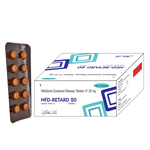nifcard
Introduction to Nifcard
Nifcard is a widely used medication primarily prescribed for the management of hypertension and angina pectoris. It belongs to the class of drugs known as calcium channel blockers, which work by relaxing the muscles of your heart and blood vessels. This relaxation allows for easier blood flow, reducing the workload on the heart and helping to lower blood pressure. Available in various forms, including tablets, injections, and capsules, Nifcard is a versatile option for patients with different medical needs. Its effectiveness and ease of use make it a preferred choice among healthcare providers.
Composition of Nifcard
The primary active ingredient in Nifcard is Nifedipine, available in a 20mg dosage. Nifedipine is a potent calcium channel blocker that inhibits the influx of calcium ions into cardiac and smooth muscle cells. By blocking these channels, Nifedipine effectively reduces the contraction of the heart and dilates the arteries, leading to decreased blood pressure and improved oxygen supply to the heart muscles. This mechanism of action makes Nifcard an effective treatment for conditions like hypertension and angina.
Uses for Nifcard
- Management of high blood pressure (hypertension)
- Treatment of chronic stable angina (chest pain)
- Relief of vasospastic angina (Prinzmetal's angina)
- Improvement of blood flow in various circulatory conditions
Side Effects of Nifcard
- Headache
- Dizziness or lightheadedness
- Flushing (warmth, redness, or tingling under your skin)
- Nausea
- Swelling in the ankles or feet
- Constipation
- Fatigue or weakness
Precautions of Nifcard
Before taking Nifcard, inform your healthcare provider if you have any allergies, especially to Nifedipine or other calcium channel blockers. Discuss your medical history, particularly if you have heart failure, liver disease, or a history of gastrointestinal blockage. It's crucial to follow your doctor's instructions regarding dosage and administration. Avoid consuming grapefruit or grapefruit juice while taking this medication, as it can increase the concentration of Nifedipine in your bloodstream and enhance side effects. Pregnant or breastfeeding women should consult their healthcare provider before using Nifcard.
Conclusion
Nifcard, with its active ingredient Nifedipine, is an effective medication for managing hypertension and angina. Its availability in various forms, including tablets, injections, and capsules, makes it adaptable to different patient needs. While generally safe and effective, it is essential to use Nifcard under medical supervision to minimize potential side effects and interactions. Always consult your healthcare provider to ensure that Nifcard is the right choice for your condition.
Similar Medicines
Disclaimer : This information is not a substitute for medical advice. Consult your healthcare provider before making any changes to your treatment . Do not ignore or delay professional medical advice based on anything you have seen or read on Medwiki.
nifcard
Prescription Required
Manufacturer :
Intra Labs India Pvt LtdComposition :
nifedipine











.svg)
